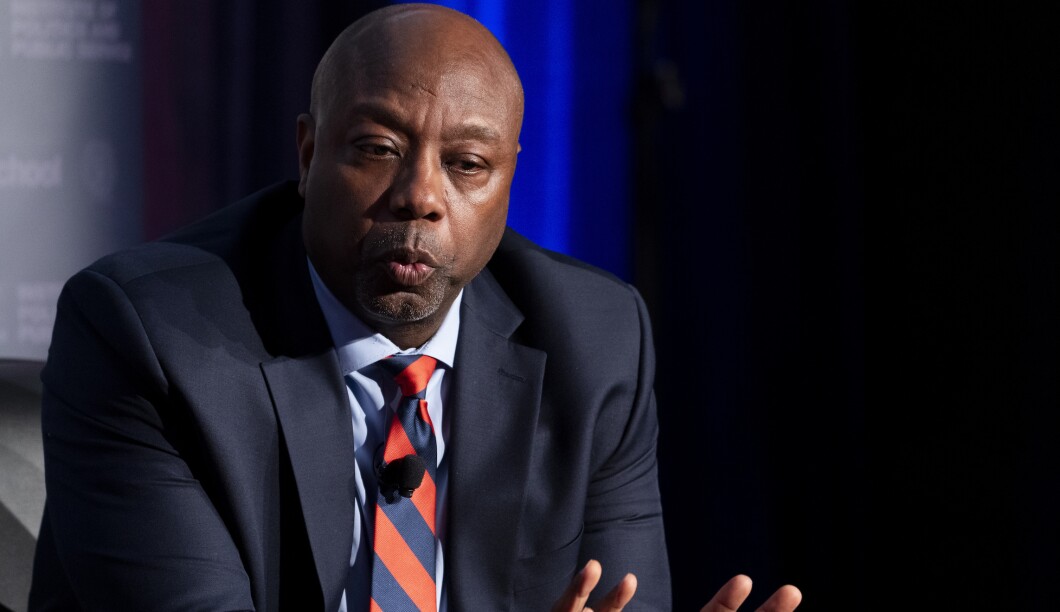
The Republican presidential primary is looking remarkably stable, a poor sign for every candidate but one, and pressure is building on lower-tier candidates to either make waves or leave the pool.
A memo from Sen. Tim Scott‘s (R-SC) Super PAC raised eyebrows by revealing that it’s backing out of a $40 million ad buy, with blunt language that calls into question the long-term veracity of his campaign.
BIDEN SHIFTS FOCUS AWAY FROM DOMESTIC AFFAIRS AS ISRAEL WAR INTENSIFIES
“We are doing what would be obvious in the business world but will mystify politicos. We aren’t going to waste our money when the electorate isn’t focused or ready for a Trump alternative,” TIMPAC Co-Chairman Rob Collins said. He added that the money will be rerouted to “fully fund” grassroots and door-knocking efforts, though it’s not exactly clear how that will work.
“We already have a robust grassroots operation underway,” a TIMPAC spokesman said. “Began in June. Just additional support.”
Scott is polling at 2% in the RealClearPolitics average, a number that brings with it more immediate challenges than whether or not he can win. The third GOP debate, to be held Nov. 8 in Miami, will require at least 4% polling in various state and national polls along with a minimum of 70,000 contributors in order to qualify.
Scott’s campaign indicates things are still full speed ahead, telling the Washington Examiner earlier this week that “Tim’s campaign was built for the long haul, powered by the most primary cash on hand and the highest candidate favorability of anyone in the field.” He filed for the 2024 South Carolina presidential primary ballot, the nation’s third after Iowa and New Hampshire, on Monday.

But it may be hard to see a path to victory for a candidate who struggles to make the debate stage. Scott isn’t alone in that conundrum. Former Vice President Mike Pence is polling at 3.8%, former New Jersey Gov. Chris Christie is at 2.8%, Gov. Doug Burgum (R-ND) stands at 0.8%, and former Arkansas Gov. Asa Hutchinson is at 0.6%.
Pence’s campaign pointed back to previous statements he’s made defending his candidacy. Burgum spokesman Lance Trover said his candidate is “focused on peaking in Iowa and New Hampshire in January of 2024, not the fall of 2023, and plans on being on the debate stage in Miami.” Efforts to reach the Hutchinson campaign were not successful.
Of the five in danger of missing the third debate, only Hutchinson failed to qualify for the second. If none of them qualify going forward, and former President Donald Trump skips again, the stage would be filled with just three candidates, Gov. Ron DeSantis (R-FL), former United Nations ambassador Nikki Haley, and entrepreneur Vivek Ramaswamy. Trump, meanwhile, is calling for the remaining debates to be canceled altogether.
Of course, there are still three months before the first votes are counted in Iowa, which can give any candidate hope.
“It’s a widely accepted axiom that candidates never really run out of reasons to run, but campaigns do, in fact, run out of money,” said Kevin Madden, a senior adviser to Sen. Mitt Romney’s (R-UT) 2012 presidential campaign. “There’s really only room for one Trump alternative, but we are still at a point in the race where everyone in the field thinks they still have time for a breakout moment.”
Madden says that a major consolidation in favor of one alternative-to-Trump candidate will be needed before or around the Iowa and New Hampshire contests if The Donald is going to be stopped.
“There will be some tough conversations and contemplations between Thanksgiving and Christmas for a few of these campaigns if they haven’t started to make big gains by then,” he said.
Rutgers University history, journalism, and media studies professor David Greenberg argues it’s still too early to be drawing conclusions.
“If I were a candidate, I’d want to stay in the race,” he said. “However, if my main goal were to stop Trump, I would work to whittle down the field. With opposition divided even two or three ways, it will be very hard to stop him.”
CLICK HERE TO READ MORE FROM THE WASHINGTON EXAMINER
For the moment, candidates are arguing who that alternative candidate should be. DeSantis remains in a solid second place but with support that is less than half what it was in the spring. Haley has surged into a solid third place of late on the heels of a rivalry with Ramaswamy and an escalating war with DeSantis.
If the Nov. 8 debate stage includes only those three candidates, it could go a long way toward deciding who carries the non-Trump flag into 2024.





